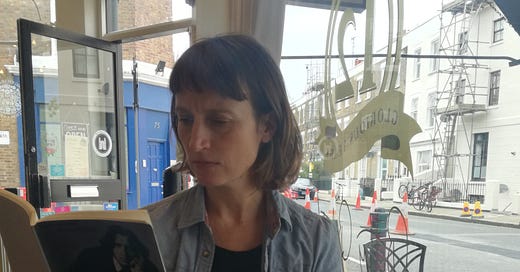Photo: drinking over-priced coffee, reading Oscar Wilde, posing. This is a lovely cafe called Betty Blythe’s in Hammersmith.
Middle-class girl goes into a pawn shop, sounds like the opening to a joke. I am almost forty and don’t generally agree with calling women girls but suddenly I feel like one again, in that I am out of place, somehow don’t quite fit, and am, in a word, diminutive. (Though this feeling perhaps gives more of an insight into my recollections of girlhood than anything else.) I am stood in the queue of the yellow and red emblazoned Cash Converters on Streatham High Road, South London. It is a Tuesday afternoon in early September and the line is five deep. Though I have walked past the CC dozens of times this is my first time inside. The air is still and no music plays. The staff are friendly but only chat a little. Both the electronics and some of the workers are kept behind glass. I go into a sort of trance while I wait determined not to look at my phone but just to be. The goods are accessed with a lock and key that hangs around the belts of the floor staff, and the staff that take in the goods are accessed through a security-coded, heavy, iron door. All wear t-shirts that read ‘sell now, buy back later’. I am here to sell only. CC seems to love a slogan and behind the glass-counter others read: ‘Be Green, Recycle! ‘We Make Life More Affordable!’ ‘Second-Hand Doesn’t Mean Second Best’. (I have always been an excellent, almost obsessive recycler, and I loathe the idea of e-waste, but I doubt that for most individuals coming here the motivation is environmental.)
I have on me the following items for sale: a dictaphone, a 2014 MacBook Air, a small sapphire and gold ring, a Samsung tablet, two key-boards and a mouse. (I keep all of these in my zip-up neon-pink Roka bag which is no doubt adding to the girlish effect; aside from the staff in their enforced vivid-yellow and red polo-shirts everyone else is dressed drably.)
I scan through the history of my items while I wait. The dictaphone that I purchased seven years ago for a research writing project that involved, in its early days, a lot of interviews (the result this book). (Not sure now why I went so old-school and didn’t just record people using my phone, some fantasy of Girl-Friday-Ephron-esque journalism perhaps?) My built-in-obsolescence MacBook, my third, two unused key-boards purchased to resolve back-pain issues and which would not work with said Mac in light of obsolescence, the tablet which I used literally once to look up the weather and once to book a spin class and which the man at Samsung had somehow upsold me when I went int for a free phone upgrade, and even though I am a tech-minimalist. And finally the ring, (a very affordable one from my first marriage which was not bought until we had already been married for over a year. The selling of which is less dramatic than it sounds; up until recently I had been using it as a prop for various drama-lit workshops I’ve put on at schools).
The queue moves forward slowly. The vibe in here is mixed. One of the floating staff flirts with a customer who is interested in some of the recording and DJ equipment. She wipes down the glass screens with newspaper and vinegar and he comments on how he does that in the bar he works in, quizzes her on the equipment, dropping in hints of his musical prowess. But other than the flirting the vibe is mostly a pushed -down one, muted, somewhat heavy. I get the impression that most people in front of me will want to ‘buy back later’. In fact when I get to the counter the man behind the glass seems surprised when I say that I just want to sell the ring. As I talk more he seems less surprised, I sound cheerful, composed and, yes, middle-class. He take the ring behind scenes in order to perform an authenticity check, something which he now seems almost apologetic for. (The ring which was bought in an antiques shop in a Hampshire market town one afternoon over fifteen years ago passes the nitric acid rub test.)
Meanwhile a man tuts and huffs behind me. He is actually, literally diminutive, I am at, a very average, 5’6 taller than him, he is swathed in various shades of grey and moves jerkily, clearly stressed, presenting as mean. I guess his age at twenty-five to thirty, though he could be much younger. He looks at me as I glance round at all the tutting and huffing ‘how long you gonna be,’ he asks. But it is not a question.
‘As long as they take,’ I reply and turn back to the counter, the ring is now back and verified but now counter-man is on his computer researching the brand and year of my dictaphone so that he can give me a good price for it.
‘This man can go first,’ I say to counter-man, ‘he seems to be in rush,’ and I look back at edgy-man.
‘Nah, that’s OK. It’s fine,’ says counter-man, looking over my shoulder and nodding encouragingly.
I am not afraid of the small angry man but his energy is cortisol-raising. His life, I can tell, is not going well.
Keep reading with a 7-day free trial
Subscribe to After the Fact to keep reading this post and get 7 days of free access to the full post archives.




